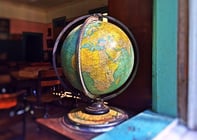Published on
Five Ways to Build a Meaningful International Experience for Online Learners

For online and non-traditional students, the idea of studying abroad is almost unheard of.
At Northeastern University’s College of Professional Studies, one small part of our institution-wide efforts at internationalizing was our creation of a study abroad program for our online graduate students. We arranged a weeklong trip to Florence, Italy, as the key component in an eight-week-long summer course. We worked with a third-party provider for logistical support, and were lucky to have a Florence-based colleague who was eager to help.
Here, in a nutshell, are five lessons we learned:
1. Keep it Simple
What We Did Right: We avoided exotic and pricier locales in favor of Florence, a tried-and-true locale used to accommodating international students. Our students were working adults, some of whom had family obligations, and we knew that getting away would be a challenge. While longer sojourns provide deeper experiences, shorter is better than not going at all. The complexities of contracts, insurance and housing made working with a third-party provider essential. However, recognizing that our students were adults coming from many states, we allowed them to arrange their own air travel.
What We Could Do Better: The provider housed students in a variety of apartments all over town. This made great sense for undergraduates spending a full semester abroad, but for our purposes, it was inefficient and robbed us of a meeting place, essential when comparing notes on different experiences. Next time, we hope to use a large Italian villa, keep everyone under one roof and use a bus for field trips and lectures.
2. Go Interdisciplinary
What We Did Right: This decision gave us a larger pool of students and, to our delight, a far more diverse community. Students were hungry for face-to-face contact and relished the chance to compare notes with online students from other programs. Our students came from education, global studies, project management and non-profit management master’s programs.
What We Could Do Better: Involve faculty from other programs more deeply. Our ability to advise students across many disciplines is limited. Concepts, terminology and methodology can be very different.
3. Consider the Timing
What We Did Right: In an eight-week online summer course, we tried to front-load as much as possible. We did a conference call session for all students before the class began, and brought in the third-party provider to go over logistics. We also rolled out the Blackboard site and explained unusual aspects of the class.
What We Could Do Better: Our trip fell in the second week of the eight-week course, far too early. The students had not fully read and digested the copious materials we had assigned on modern Italy, let alone identified their research questions. We also found varying levels of expertise in research methods, which meant spending considerable time in Italy going over methodology and literature reviews.
4. Keep it Rigorous
What We Did Right: There is no question this was academically credible. Each student was required to conduct original research, usually by conducting interviews with Italians about some aspect of modern Italy. For example, one student focused on the Chinese and Indian immigrant population and managed to conduct seven interviews. Another looked at how Italy fit into the Bologna process and conducted four interviews with experts.
What We Could Do Better: This was as exhausting for us as it was for our students. Finding interview subjects without much notice and conducting them in only a week’s time put everyone under incredible pressure. This schedule allowed no time for students to refine their topics — or change them. For some, conducting research interviews in a foreign country was a deep-end-of-the-pool experience.
5. Allow Time for Cultural Observations
What We Did Right: An important part of study abroad is savoring the sense of being far from home and getting to know the sights, sounds and tastes of a foreign locale. We nearly missed this key component by focusing too heavily on academics, but our Italy-based colleague gently insisted on space for cultural encounters and for group reflections, something the students (and we) truly relished.
What We Could Do Better: Next time, instead of hearing a lecture from an Italian each morning from 9 a.m. to noon, we’ll get out and visit Italians in situ. Our visits might range from a modern factory to regional government offices to a television station to even (perhaps) a university.



